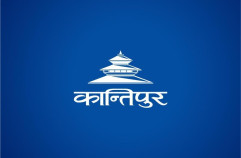Concerns about nature and tourism at a literature festival
We use Google Cloud Translation Services. Google requires we provide the following disclaimer relating to use of this service:
This service may contain translations powered by Google. Google disclaims all warranties related to the translations, expressed or implied, including any warranties of accuracy, reliability, and any implied warranties of merchantability, fitness for a particular purpose, and noninfringement.


The 11th Nepal Literature Festival ended on Monday, debating not only literature, music, cinema, but also politics, economy, education, nature, and tourism. 250 speakers participated in discussions in 59 different sessions at the festival which started on February 3 on the shores of Fewatal under the organization of Wukworm Foundation.


On the last day of the
festival, Anilkeshari Shah interacted with Rohini Rana, the author of the book 'The Nepal Cookbook' during the 'Taste of Nepalese tradition' session. Rohini said that even though she has traveled the world and tasted different flavors, she has not been able to erase the taste of dal, rice and vegetables.
Earlier, his English-language book 'The Rana Cook Book Recipes from the Palaces of Nepal' contained the culinary art of dishes cooked in the kitchens of 9 Prime Ministers from Jung Bahadur Rana to Mohan Shamsher Rana. In a chat with a former banker, Rohini revealed her secret from not knowing how to cook as a child to writing a culinary education book. Suraj Subedi had a conversation with director and dramatist Anup Baral and actress Srishti Shrestha in the
'Abhinayko Farak Andaz' session. In that session, Baral said that an honest actor is the most liar in the world . He argued that the quality of a skilled actor is to be able to stand as a character different from himself and make the audience believe in it. Actress Srishti Shrestha said that she always remembers that she is working in the director's vision while acting in a film.
'You don't know how you react in a scene, but the character is in that reaction. The workshop before filming, the discussion about the film and the characters bring the actor and the director on the same stage.''
'Back to nature' session, author Dadi Sapkota with Maheshwar Dhakal, joint secretary of the Government of Nepal and joint secretary of the Nepal Government Maheshwar Dhakal in the 'Back to nature' session. Talked . In the conversation, the participants discussed the monkey-related problems that Nepal is facing.
Dhakal thought that the local level should be authorized to solve the problem as the law of Nepal prohibits killing and moving monkeys. Kaski's monkey problem is not compatible with Syangja. Syangja's problem is not compatible with Tanahun . As it varies according to time, place, and environment, the government should support the local level in making policies through research," he said.
In that session, Rajendra Suwal of the World Wildlife Fund opined that all three governments should be concerned about wetland conservation. In the 'Ghumanteka Kura' session, Kanchan Rai and Pooja Rizal shared their travel experience with Deepakraj Joshi, the former Chief Executive Officer of the Tourism Board. Rai, a 'content creator' who likes to travel and shows his travels to others, says that he should travel to change himself rather than just for entertainment. Rizal says that it is a very good thing that the local government has been active in making its place known in recent years.
Journalist Jamuna Varsha Sharma interacted with Syangja farmer Bhim Luintel, businessman Chandrakant Baral and Navraj Devkota in the 'Lessons of Failure' session. Raju Adhikari explained the benefits and methods of yoga in the session 'Yoga for student's capacity development'.
Chaitanya Mishra highlighted the importance of social education in the session 'Social Education and Our Curriculum'. Journalist Yogash Dhakal along with Vipin Adhikari, Kusum Shakya and Sanjeev Upreti discussed the problems in the university and the measures needed to improve them in the session 'Sutras of University Reform'. Speakers Hari Sharma, Chandradev Joshi and Samishka Baskota interacted with author Chandra Kishore in the session 'Ranatantra, Rajatantra and Republic'.
The speaker opined that even though the system has changed, good governance has not yet been paid attention to. In the session 'Walking, Paya Mating', writer Khagendra Sangraula revealed the side of his literary and social life with facilitator Bhaskar Gautam. Journalist Kanakmani Dixit discussed with Dhanraj Acharya, head of Pokhara Metropolitan Municipality, in the session 'Culture, Geography, Geology: Tourist Destinations of Pokhara'. In that session, Acharya said that the metropolis is planning to bring in expensive tourists.
In the next session, the audience enjoyed the muktak and ghazal of Santosh Amgai and Pradeep Rodan. The session on 'Dimensions of Relationships' attracted the audience . In this session, the audience listened with interest to novelist Amar Neupane's dialogue with Vijay Kumar. At the end of the literature festival, the audience was mesmerized by the musical performance of Vipul Chhetri and the traveling band.
प्रकाशित : फाल्गुन ७, २०८० २१:१९
 २३.१२°C काठमाडौं
२३.१२°C काठमाडौं
















